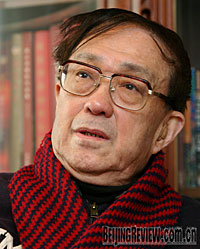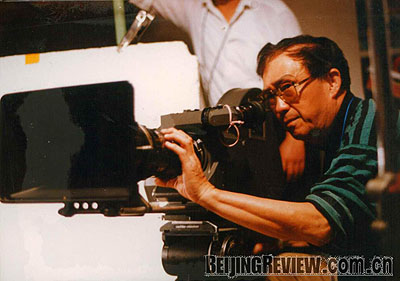| 
A legend of Chinese cinema is dead. Master film director Xie Jin passed away on October 18, aged 85, leaving behind a legacy of work that has influenced generations of Chinese movie fans.
Xie is heralded as the iconic representative of the third generation of China's film directors. His films are considered classics and cover the most important periods of China, dating back to 1949.
His work comprises more than 30 films made over a 50-year period and mirrors the development of Chinese society. Paying great attention to the fate of the country, Xie intended to show the rise and fall of Chinese society as people struggled with social changes.
Most of his colleagues and friends told the media after his death that Xie was obsessed with films and had once famously said he hoped his life would end beside the camera.
People's favorite
Born in 1923, Xie set his sights on being a film director at a very young age. His career as a director formally started in 1951 with his first work Accuse. Then in 1957 his film Woman Basketball Player No. 5 became a big hit at home and abroad. Since those early days he produced a series of weighty films, many of which won critical acclaim locally and on the international circuit.
Xie's honors include the Golden Rooster Award, the highest professional award for Chinese films, and six Baihua Awards, voted for by ordinary moviegoers.
Although Xie's most influential movies were made in the 1980s, according to Yin Hong, a professor at the School of Journalism and Communication at Tsinghua University, a survey conducted at the end of the 1990s among 1,500 people over 18 in Beijing, Shanghai and Guangzhou shows that Xie ranked first among the film directors most loved by Chinese audiences. Director Zhang Yimou ranked second.
"It shows that Xie still enjoyed the highest status in the heart of Chinese audiences," Yin said.
Xie's achievements in filmmaking have also been recognized by his international colleagues. In 1986, Xie was invited to become a member of the Academy of Motion Picture Arts and Sciences and the Union of Film Directors of the United States.

CAMERA, ACTION: Xie Jin was still busy behind the camera in his final years
He was also invited to become a judge at many prestigious film festivals around the world, including the Venice International Film Festival and the Tokyo International Film Festival. Western critics once said that Xie's films had reached the same height as those of Hollywood in the 1950s and 60s.
When Japanese director Akira Kurosawa passed away in 1998, some commentators said that the baton of Asian films had passed to the hands of Xie.
Recording social change
Zheng Dongtian, a professor at the Beijing Film Academy, told the Shanghai-based Wen Hui Bao newspaper that Xie's unique film narrative style, which is called the "Xie Mode" in China, has been a cornerstone of Chinese films and is irreplaceable.
Zheng said that Xie was well-known for his realistic creative style, combined with the exploration of social issues. According to him, among the more than 30 films made by Xie, most focused on the reality of life, and only three were about historical topics, which also had a combination of history and reality.
The film Furong Town was the climax of Xie's career. In Zheng's eyes Furong Town recorded the whole course of the "cultural revolution" (1966-76) in an artistic way. Through the changes of the lives of several ordinary persons, the film discusses the effects of the "cultural revolution" on Chinese people and rethinks that part of history.
| 